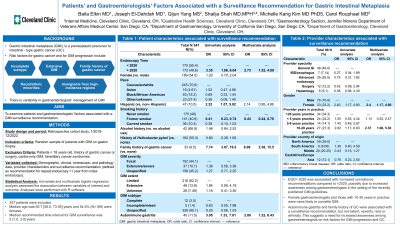Monday Poster Session
Category: Stomach
P2735 - Patients and Gastroenterologists’ Factors Associated with a Surveillance Recommendation for Gastric Intestinal Metaplasia
Monday, October 23, 2023
10:30 AM - 4:15 PM PT
Location: Exhibit Hall

Has Audio

Baila Elkin, MD
Cleveland Clinic Foundation
Cleveland, OH
Presenting Author(s)
Baila Elkin, MD1, Joseph El Dahdah, MD2, Qijun Yang, MS3, Shailja C. Shah, MD, MPH4, Michelle Kim, MD1, Carol Rouphael, MD2
1Cleveland Clinic Foundation, Cleveland, OH; 2Cleveland Clinic, Cleveland, OH; 3Lerner Research Institute, Cleveland, OH; 4Jennifer Moreno Veteran Affairs San Diego Healthcare System, San Diego, CA
Introduction: Gastric intestinal metaplasia (GIM) is an accepted precursor to non-cardia gastric cancer (NCGC), with a pooled prevalence of 4.8% in the United States (US). Risk factors for GIM progression include incomplete histopathologic subtype, extensive GIM (antrum/incisura and other noncardia location), family history of gastric cancer, racial/ethnic minorities, and immigrants from high-incidence regions. Literature shows variability in gastroenterologists' management of GIM. We examined patients' and gastroenterologists’ factors associated with a GIM surveillance recommendation at a US tertiary care center.
Methods: A sample of patients >18 years with GIM on biopsy from upper endoscopy (EGD) done between 2018 and 2022 were included in this retrospective cohort study. Exclusions were history of gastric cancer or surgery, cardia-only GIM, hereditary cancer syndromes. Patients’ demographic, clinical, endoscopic, and pathology data, and gastroenterologists’ characteristics and surveillance recommendations were collected. Univariate and multivariate logistic regression analysis assessed the association between variables of interest and outcome. Analyses were performed with R software.
Results: 347 patients were included. Median age was 65.7[56.0,73.05] years and 54.5% were females. The median recommended time interval for GIM surveillance was 2[1.0,3.0] years. On multivariate analysis, endoscopy >2020 was associated with a surveillance recommendation compared to < 2020 (OR 2.86 p< 0.001), as well as Hispanic/Latino ethnicity (OR 2.35 p=0.024), family history of gastric cancer (OR 5.78, p< 0.001), extensive GIM (OR 2.37 p=0.025), provider female sex (OR 2.31, p=0.004), and provider years in practice 10-20 years (OR 2.02 p=0.039). Autoimmune gastritis and race were not (Table1).
Discussion: Our data show several factors impacting gastroenterologists’ management of GIM including family history of gastric cancer, ethnicity and extensive GIM, which are known risk factors for GIM progression to NCGC. EGD >2020 was also associated with increased surveillance, possibly due to increased awareness among gastroenterologists following the 2020 American Gastroenterological Association GIM guidelines. Female gastroenterologists and those with 10-20 years in practice were also more likely to surveille GIM. Autoimmune gastritis and race (Asian, African American) are risk factors for GIM progression, but were not associated with increased surveillance recommendations, indicating possible need for increased awareness.
Disclosures:
Baila Elkin, MD1, Joseph El Dahdah, MD2, Qijun Yang, MS3, Shailja C. Shah, MD, MPH4, Michelle Kim, MD1, Carol Rouphael, MD2. P2735 - Patients and Gastroenterologists’ Factors Associated with a Surveillance Recommendation for Gastric Intestinal Metaplasia, ACG 2023 Annual Scientific Meeting Abstracts. Vancouver, BC, Canada: American College of Gastroenterology.
1Cleveland Clinic Foundation, Cleveland, OH; 2Cleveland Clinic, Cleveland, OH; 3Lerner Research Institute, Cleveland, OH; 4Jennifer Moreno Veteran Affairs San Diego Healthcare System, San Diego, CA
Introduction: Gastric intestinal metaplasia (GIM) is an accepted precursor to non-cardia gastric cancer (NCGC), with a pooled prevalence of 4.8% in the United States (US). Risk factors for GIM progression include incomplete histopathologic subtype, extensive GIM (antrum/incisura and other noncardia location), family history of gastric cancer, racial/ethnic minorities, and immigrants from high-incidence regions. Literature shows variability in gastroenterologists' management of GIM. We examined patients' and gastroenterologists’ factors associated with a GIM surveillance recommendation at a US tertiary care center.
Methods: A sample of patients >18 years with GIM on biopsy from upper endoscopy (EGD) done between 2018 and 2022 were included in this retrospective cohort study. Exclusions were history of gastric cancer or surgery, cardia-only GIM, hereditary cancer syndromes. Patients’ demographic, clinical, endoscopic, and pathology data, and gastroenterologists’ characteristics and surveillance recommendations were collected. Univariate and multivariate logistic regression analysis assessed the association between variables of interest and outcome. Analyses were performed with R software.
Results: 347 patients were included. Median age was 65.7[56.0,73.05] years and 54.5% were females. The median recommended time interval for GIM surveillance was 2[1.0,3.0] years. On multivariate analysis, endoscopy >2020 was associated with a surveillance recommendation compared to < 2020 (OR 2.86 p< 0.001), as well as Hispanic/Latino ethnicity (OR 2.35 p=0.024), family history of gastric cancer (OR 5.78, p< 0.001), extensive GIM (OR 2.37 p=0.025), provider female sex (OR 2.31, p=0.004), and provider years in practice 10-20 years (OR 2.02 p=0.039). Autoimmune gastritis and race were not (Table1).
Discussion: Our data show several factors impacting gastroenterologists’ management of GIM including family history of gastric cancer, ethnicity and extensive GIM, which are known risk factors for GIM progression to NCGC. EGD >2020 was also associated with increased surveillance, possibly due to increased awareness among gastroenterologists following the 2020 American Gastroenterological Association GIM guidelines. Female gastroenterologists and those with 10-20 years in practice were also more likely to surveille GIM. Autoimmune gastritis and race (Asian, African American) are risk factors for GIM progression, but were not associated with increased surveillance recommendations, indicating possible need for increased awareness.
Disclosures:
Baila Elkin indicated no relevant financial relationships.
Joseph El Dahdah indicated no relevant financial relationships.
Qijun Yang indicated no relevant financial relationships.
Shailja Shah: GLG – Consultant. Guidepoint – Consultant. Phathom Pharmaceuticals – Consultant. RedHill Biopharma – Consultant.
Michelle Kim indicated no relevant financial relationships.
Carol Rouphael indicated no relevant financial relationships.
Baila Elkin, MD1, Joseph El Dahdah, MD2, Qijun Yang, MS3, Shailja C. Shah, MD, MPH4, Michelle Kim, MD1, Carol Rouphael, MD2. P2735 - Patients and Gastroenterologists’ Factors Associated with a Surveillance Recommendation for Gastric Intestinal Metaplasia, ACG 2023 Annual Scientific Meeting Abstracts. Vancouver, BC, Canada: American College of Gastroenterology.
